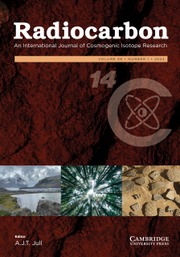Crossref Citations
This article has been cited by the following publications. This list is generated based on data provided by
Crossref.
Urch, D. S.
2003.
27 Radiochemistry.
Annu. Rep. Prog. Chem., Sect. A: Inorg. Chem.,
Vol. 99,
Issue. ,
p.
545.
Yizhaq, Meirav
Mintz, Genia
Cohen, Illit
Khalaily, Hamudi
Weiner, Steve
and
Boaretto, Elisabetta
2005.
Quality Controlled Radiocarbon Dating of Bones and Charcoal from the Early Pre-Pottery Neolithic B (PPNB) of Motza (Israel).
Radiocarbon,
Vol. 47,
Issue. 2,
p.
193.
Jull, A.J.T.
and
Burr, G.S.
2006.
Accelerator mass spectrometry: Is the future bigger or smaller?.
Earth and Planetary Science Letters,
Vol. 243,
Issue. 3-4,
p.
305.
NELSON, GREG C.
and
FITZPATRICK, SCOTT M.
2006.
Preliminary investigations of the Chelechol ra Orrak Cemetery, Republic of Palau: I, skeletal biology and paleopathology.
Anthropological Science,
Vol. 114,
Issue. 1,
p.
1.
Cohen-Ofri, Ilit
Weiner, Lev
Boaretto, Elisabetta
Mintz, Genia
and
Weiner, Steve
2006.
Modern and fossil charcoal: aspects of structure and diagenesis.
Journal of Archaeological Science,
Vol. 33,
Issue. 3,
p.
428.
Lengyel, György
Boaretto, Elisabetta
Fabre, Laurent
and
Ronen, Avraham
2006.
New AMS14C Dates from The Early Upper Paleolithic Sequence of Raqefet Cave, Mount Carmel, Israel.
Radiocarbon,
Vol. 48,
Issue. 2,
p.
253.
Kaiser, Knut
Schoch, Werner H.
and
Miehe, Georg
2007.
Holocene paleosols and colluvial sediments in Northeast Tibet (Qinghai Province, China): Properties, dating and paleoenvironmental implications.
CATENA,
Vol. 69,
Issue. 2,
p.
91.
Bird, M.I.
2007.
Encyclopedia of Quaternary Science.
p.
2950.
Sharon, Ilan
Gilboa, Ayelet
Jull, A J Timothy
and
Boaretto, Elisabetta
2007.
Report on the First Stage of the Iron Age Dating Project in Israel: Supporting a Low Chronology.
Radiocarbon,
Vol. 49,
Issue. 1,
p.
1.
BRONK RAMSEY, C.
2008.
RADIOCARBON DATING: REVOLUTIONS IN UNDERSTANDING*.
Archaeometry,
Vol. 50,
Issue. 2,
p.
249.
Rebollo, N R
Cohen-Ofri, I
Popovitz-Biro, R
Bar-Yosef, O
Meignen, L
Goldberg, P
Weiner, S
and
Boaretto, E
2008.
Structural Characterization of Charcoal Exposed to High and Low Ph: Implications for 14C Sample Preparation and Charcoal Preservation.
Radiocarbon,
Vol. 50,
Issue. 2,
p.
289.
Brock, F
and
Higham, T F G
2009.
AMS Radiocarbon Dating of Paleolithic-Aged Charcoal from Europe and the Mediterranean Rim Using ABOx-SC.
Radiocarbon,
Vol. 51,
Issue. 2,
p.
839.
Boaretto, Elisabetta
Wu, Xiaohong
Yuan, Jiarong
Bar-Yosef, Ofer
Chu, Vikki
Pan, Yan
Liu, Kexin
Cohen, David
Jiao, Tianlong
Li, Shuicheng
Gu, Haibin
Goldberg, Paul
and
Weiner, Steve
2009.
Radiocarbon dating of charcoal and bone collagen associated with early pottery at Yuchanyan Cave, Hunan Province, China.
Proceedings of the National Academy of Sciences,
Vol. 106,
Issue. 24,
p.
9595.
Atsumi, Shin
Yoneda, Minoru
Shibata, Yasuyuki
Hokura, Akiko
and
Nakai, Izumi
2009.
Chemical evaluation of the ABA pretreatment of charcoal samples for radiocarbon dating.
The Quaternary Research (Daiyonki-Kenkyu),
Vol. 48,
Issue. 4,
p.
289.
Kaiser, Knut
Lai, Zhongping
Schneider, Birgit
Reudenbach, Christoph
Miehe, Georg
and
Brückner, Helmut
2009.
Stratigraphy and palaeoenvironmental implications of Pleistocene and Holocene aeolian sediments in the Lhasa area, southern Tibet (China).
Palaeogeography, Palaeoclimatology, Palaeoecology,
Vol. 271,
Issue. 3-4,
p.
329.
Kaiser, Knut
Opgenoorth, Lars
Schoch, Werner H.
and
Miehe, Georg
2009.
Charcoal and fossil wood from palaeosols, sediments and artificial structures indicating Late Holocene woodland decline in southern Tibet (China).
Quaternary Science Reviews,
Vol. 28,
Issue. 15-16,
p.
1539.
Boaretto, Elisabetta
2009.
Dating Materials in Good Archaeological Contexts: The Next Challenge for Radiocarbon Analysis.
Radiocarbon,
Vol. 51,
Issue. 1,
p.
275.
Eckmeier, Eileen
Van der Borg, Klaas
Tegtmeier, Ursula
Schmidt, Michael W I
and
Gerlach, Renate
2009.
Dating Charred Soil Organic Matter: Comparison of Radiocarbon Ages from Macrocharcoals and Chemically Separated Charcoal Carbon.
Radiocarbon,
Vol. 51,
Issue. 2,
p.
437.
KAISER, KNUT
HILGERS, ALEXANDRA
SCHLAAK, NORBERT
JANKOWSKI, MICHAŁ
KÜHN, PETER
BUSSEMER, SIXTEN
and
PRZEGIĘTKA, KRZYSZTOF
2009.
Palaeopedological marker horizons in northern central Europe: characteristics of Lateglacial Usselo and Finow soils.
Boreas,
Vol. 38,
Issue. 3,
p.
591.
Harangi, Sz
Molnár, M
Vinkler, A P
Kiss, B
Jull, A J T
and
Leonard, A G
2010.
Radiocarbon Dating of the Last Volcanic Eruptions of Ciomadul Volcano, Southeast Carpathians, Eastern-Central Europe.
Radiocarbon,
Vol. 52,
Issue. 3,
p.
1498.

